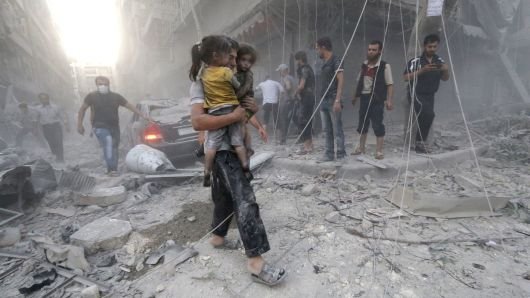Gold Silver Reports (GSR) – A chemical weapons watchdog says chlorine may have been used in April’s attack on the Syrian city of Douma. The interim report by the Organization for the Prohibition of Chemical Weapons (OPCW) said “various chlorinated organic chemicals” had been found but there was no evidence of nerve agents. Dozens of civilians were killed in the attack on the rebel-held town in the Eastern Ghouta region near Damascus.
The Syrian government denies carrying out any chemical weapons attacks….
Following the Douma-attack, US, British and French warplanes launched strikes against government military targets.
The OPCW was recently given new powers by member states to name those responsible for using chemical weapons. Its investigation into the Douma attack is continuing.
Medics in Douma reported on 7 April that more than 500 patients had been brought to medical facilities with symptoms suggesting exposure to a chemical agent.
Rescue workers also reported a strong smell of chlorine in the air following an air strike that targeted two locations in Douma.
The OPCW sent a fact-finding mission to Douma about a week later.
Douma ‘chemical attack’: What we know
Eastern Ghouta devastation seen from space
“Along with explosive residues, various chlorinated organic chemicals were found in samples from two sites,” the preliminary report said.
“Work by the team to establish the significance of these results is on-going. The FFM (fact-finding mission) team will continue its work to draw final conclusions.”
The report said two samples from gas cylinders recovered at the scene tested positive for chlorine.
Following the attack, a UN investigation said evidence pointed to the use of chlorine but that some people had exhibited symptoms more consistent with exposure to a nerve agent.
The OPCW report, however, said that “no organophosphorous nerve agents or their degradation products were detected” at the sites.
The five-year siege of the Eastern Ghouta, an agricultural region outside the capital where at least 265,000 civilians lived, was the longest in modern history.
It came to an end in April, after a two-month offensive by pro-government forces, backed by Russian air strikes, that decimated homes, businesses and hospitals and reportedly left more than 1,700 men, women and children dead.
Russia and Syria sought to disprove that Douma was hit by a poison gas attack, and in April brought a group of Syrians to the global chemical weapons watchdog’s headquarters in The Hague to denounce the reports of an illegal attack as fake.
The insistence by Russia and Syria that a chemical weapons attack was staged runs counter to accounts from witnesses and survivors interviewed by media, some of them in Douma, who described being overwhelmed by a strong smell of chlorine.
Some survivors interviewed in Douma after government forces took control of the town blamed rebels from the Army of Islam group of being behind the attack.
The results show that no nerve agents or their degradation products were detected in the environmental samples or in the plasma samples taken from alleged casualties,” the OPCW report states.
“Along with explosive residues, various chlorinated organic chemicals were found in samples from two sites, for which there is full chain of custody. Work by the team to establish the significance of these results is ongoing.”
No blame has been apportioned for any of the attacks in Syria investigated by the OPCW, with Russia accusing the UK of having staged the bombardment in April.
Despite facing a backlash for not allowing MPs to vote on UK involvement in the retaliatory western military action, Theresa May said at the time it was “morally and legally right” to respond.
US President Donald Trump was unapologetic for the strikes, which were focused on three chemical weapons and research facilities, describing the Syrian leader as an “animal”. – Neal Bhai Reports
